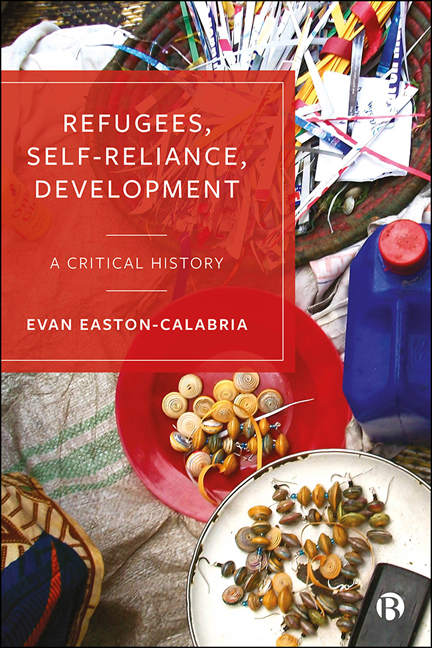Book contents
- Frontmatter
- Dedication
- Contents
- List of Figures and Tables
- Abbreviations and Acronyms
- Notes on the Author
- Acknowledgements
- 1 Introduction: Why Refugee Self-Reliance?
- 2 Self-Sufficiency out of Necessity: Refugee Self-Reliance Assistance in Interwar Greece
- 3 Socialism and Self-Reliance: Refugee Self-Reliance Assistance in Post-Colonial East Africa
- 4 Warriors of Self-Reliance: Refugee Self-Reliance Assistance in Cold War Pakistan
- 5 Dignity in Informality? Urban Refugee Self-Reliance Assistance in Kampala, Uganda
- 6 Livelihoods 2.0? Refugee Self-Reliance and the Digital Gig Economy
- 7 Conclusion
- Annex: A Note on Methods and Sources
- References
- Index
4 - Warriors of Self-Reliance: Refugee Self-Reliance Assistance in Cold War Pakistan
Published online by Cambridge University Press: 12 October 2022
- Frontmatter
- Dedication
- Contents
- List of Figures and Tables
- Abbreviations and Acronyms
- Notes on the Author
- Acknowledgements
- 1 Introduction: Why Refugee Self-Reliance?
- 2 Self-Sufficiency out of Necessity: Refugee Self-Reliance Assistance in Interwar Greece
- 3 Socialism and Self-Reliance: Refugee Self-Reliance Assistance in Post-Colonial East Africa
- 4 Warriors of Self-Reliance: Refugee Self-Reliance Assistance in Cold War Pakistan
- 5 Dignity in Informality? Urban Refugee Self-Reliance Assistance in Kampala, Uganda
- 6 Livelihoods 2.0? Refugee Self-Reliance and the Digital Gig Economy
- 7 Conclusion
- Annex: A Note on Methods and Sources
- References
- Index
Summary
Introduction
Just a few months into his tenure in 1986, UN High Commissioner for Refugees Jean-Pierre Hocké made a trip to refugee-hosting regions of Pakistan. He stated:
UNHCR must proceed along two major lines of action. First, we must react to existing and new refugee crises with a three-pronged approach that combines effective emergency response, the prompt establishment of basic services, and early action in respect of income-generating activities that will quickly put the refugees back on their feet. Second, and almost simultaneously, we must embark on a systematic and dynamic search for solutions to end the problem, so that the refugees need not be refugees indefinitely.
In the same speech, Hocké cited a UNHCR/ World Bank project in Pakistan for Afghan refugees as a model of development assistance, and succinctly outlined the advantages of merging refugee self-reliance with national development:
Where such projects can be successfully implemented in the context of the host country's national development plans, they achieve a triple benefit: they maintain the refugees’ self-respect and sustaining their will to return home; they offer development opportunities to the local population; and they permit the host country to limit the damage caused by large influxes and to inherit, wherever possible, a tangible legacy when the refugees leave their soil.
In essence, Hocké's statement outlines the League of Nations’ approach to refugee assistance; a combination of emergency relief and development assistance at the beginning of displacement. A familiar ‘triple bottom line’ of refugee self-reliance assistance is also presented – its potential to support refugees in supporting themselves while helping local hosts and the development of their host country as a whole. It is a long journey from Tanzania to Pakistan, but evidently the concept of refugee self-reliance made the trip.
The linkage of self-reliance with development – at least on paper – continued throughout the decade. However, similar to other discursive shifts we have already seen, the language of the often similar assistance programmes to foster refugee self-reliance changed yet again. In the 1980s, no longer was ‘integrated rural development’ or ‘zonal development’ cited as a goal; instead, the aim was refugees’ ‘income generation’ and ‘economic self-reliance’ in ways that also targeted ‘national development’ or ‘economic development’.
- Type
- Chapter
- Information
- Refugees, Self-reliance, DevelopmentA Critical History, pp. 94 - 126Publisher: Bristol University PressPrint publication year: 2022



